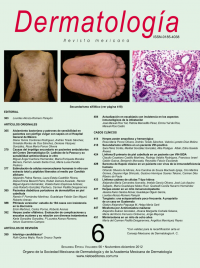RESUMEN
Antecedentes: el herpes zoster oftálmico induce una considerable morbilidad y, aunque puede manifestarse en cualquier etapa, prevalece en la edad avanzada. Las complicaciones oftalmológicas tienen una fuerte repercusión en la calidad de vida, por lo que establecer un tratamiento efectivo y oportuno constituye una prioridad. Objetivo: evaluar las complicaciones y secuelas oftalmológicas que sufren los pacientes con zoster oftálmico, con seguimiento a corto y mediano plazo, y su relación con diversos tratamientos recibidos durante el periodo agudo, dentro y fuera del centro. Pacientes y método: se realizó un estudio prospectivo, observacional y longitudinal (seguimiento de cohorte) en el Centro Dermatológico Dr. Ladislao de la Pascua, en el cual se incluyeron todos los pacientes, hombres y mujeres de cualquier edad, con herpes zoster oftálmico que acudieron a la consulta externa durante un periodo de nueve meses. A todos los pacientes se les realizó una valoración oftalmológica completa. Resultados: se estudiaron 19 pacientes –11 de ellos hombres–, con una media de edad de 49.8 años. Ocho de ellos se atendieron en las primeras 72 horas. Cuatro de los individuos mostraban signo de Hutchinson. Todos los pacientes tenían afectación de las estructuras oculares, 14 en la conjuntiva, 12 en la córnea, cinco palpebrales y cuatro en la úvea. Dieciséis sufrieron alteraciones neurológicas; dos casos tuvieron alteraciones motoras y 14, neuralgia postherpética. Tres pacientes a los que se les prescribió aciclovir fuera del Centro, en tiempo, dosis e intervalos adecuados, no experimentaron complicaciones oculares. Nueve pacientes recibieron aciclovir y prednisona en el Centro Dermatológico Pascua en los primeros siete días de evolución. Todos fueron evaluados por personal del Servicio de Oftalmología. Los pacientes que recibieron aciclovir, solo o en combinación con prednisona, mostraron una recuperación completa sin secuelas. Siete pacientes a los que se les trató con antivirales inadecuados o sin antivirales cursaron con secuelas importantes, independientemente de la edad. Conclusiones: los pacientes que recibieron tratamiento antiviral oportuno, solo o en combinación con prednisona, tuvieron una evolución más favorable que los que no lo recibieron. Palabras clave: herpes zoster oftálmico, complicaciones oculares, aciclovir, prednisona.
Palabras clave: prednisona, complicaciones oculares, herpes zoster oftálmico, aciclovir
ABSTRACT
Background: Herpes zoster ophthalmicus (HZO) is considered an important cause of morbidity mainly in elderly people. Ophthalmic complications cause great impact on the quality of life, therefore it is very important to establish a prompt detection and treatment. Objective: To evaluate potential ophthalmic complications and consequences in patients with HZO who received several kinds of treatments during the first 72 hours of evolution and after the onset of clinical signs and symptoms inside and outside of our workplace. Patients and methods: A prospective, longitudinal and observational study carried out at Dermatological Center Dr. Ladislao de la Pascua in Mexico City was made, in which all patients, men and women of any age, with HZO attended to external consultation over a period of nine months were included. All patients received a complete ophthalmologic evaluation. Results: Of the 19 patients studied with HZO, 11 (58%) were men. The media age was 49.8 years. Eight patients were evaluated during the first 72 hours of evolution. Four had Hutchinson’s sign. All of the patients studied developed various eye manifestations and disorders; 14 of them had manifestations in conjunctiva (three with conjunctivitis), 12 had corneal disorders (63%), five had eyelid affectation (26%) and two, alterations in the uvea (21%). Sixteen patients had neurological injury (84%), two of them with motor skills affected and 14 with pain six weeks after the acute episode. Only three patients in the study received treatment with acyclovir (at adequate dose and intervals) during the onset of symptoms. Another doctor saw these patients before they went to Dermatological Center Dr. Ladislao de la Pascua. None of them suffered ocular complications. Seven patients at our dermatologic center received the combined treatment of acyclovir and prednisone during the first 72 hours of evolution and two patients after this time (previous ophthalmologic evaluation). We observed that all of these patients had a complete recovery from the anatomic damage as well as from the functional damage. Seven patients who received inadequate or non-antiviral therapy suffered important consequences regardless of age or time of evolution. Conclusions: Appropriate antiviral therapy, alone or in combination with prednisone, conditioned favorable prognosis than in those patients who did not receive it. Key words: ophthalmic herpes zoster, ocular complications, acyclovir, prednisone.
Keywords: prednisone, ophthalmic herpes zoster, ocular complications, acyclovir

